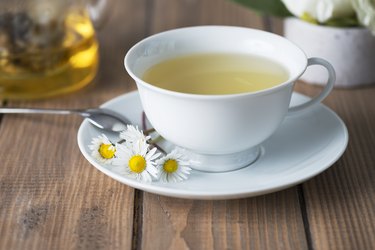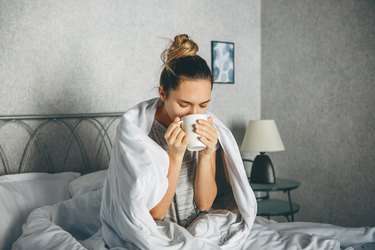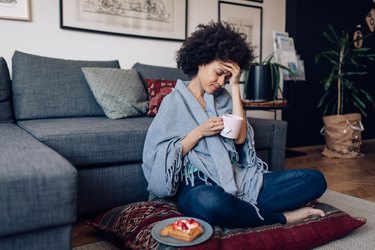
Celestial Seasonings' Sleepytime Tea is a much-loved nighttime remedy of an herbal blend that includes chamomile, spearmint and tilia flowers, among others. There are over a dozen types of Sleepytime tea, all geared toward getting a more restful night's sleep.
Sleepytime Tea was created to calm and soothe the system before bedtime, using an all-natural blend of herbs. While there are benefits to drinking herbal teas, they can also potentially create side effects in some individuals with allergies or sensitivities.
Video of the Day
Video of the Day
We consulted with registered dietitian Moushumi Mukherjee, RDN, on the benefits of drinking Sleepytime tea and possible side effects you might experience.
Tip
Sleepytime Tea includes chamomile, spearmint, lemongrass, tilia flowers, blackberry leaves, orange blossoms, hawthorn and rosebuds. Some tea drinkers, however, may experience an allergic reaction, or a drop in blood pressure or sugar levels in response to it.
Benefits of Drinking Sleepytime Tea
It Soothes and Relaxes
The main herb in Sleepytime tea that is often promoted for relaxation and sleepiness is chamomile, which Mukherjee says has a sleep-inducing effect. Drinking tea, in general, helps relax and soothe the brain and body, Mukherjee says.
The research into chamomile for inducing sleep and improving sleep quality isn't so extensive. A June 2019 review in Phytotherapy Research found that chamomile improved sleep quality in multiple studies. But the type of chamomile used for the studies included topical and oral chamomile, which may not be generalized to the amount or type found in tea.
It May Help With Anxiety
Preliminary studies suggest chamomile may help with anxiety, but this is largely inconclusive, per the National Center for Complementary and Integrative Health (NCCIH).
Sleepytime tea also contains the herb tilia, which Mukherjee says can help with inflammation, colds, and anxiety. Tilia is sometimes referred to as linden. According to anecdotal evidence and older studies, linden has been shown to help reduce anxiety, per February 2009 research in Toxicology and Applied Pharmacology.
Sleepytime Lavender tea may offer the benefit of anxiety reduction. Lavender tea was linked to reduced depression and anxiety scores in 30 older adults, according to a May 2020 study in Complementary Therapies in Medicine.
Side Effects of Sleepytime Tea
1. It May Give You a Headache
An ingredient in Sleepytime Extra contains an herb called valerian. "Valerian has been shown to cause headaches, dizziness and upset stomach, specifically when taken over long periods of time," Mukherjee says.
The NCCIH adds that valerian may leave you drowsy in the morning when you wake up and may produce vivid dreams or dry mouth.
Warning
Tea with valerian should not be taken during pregnancy or while breastfeeding, as we don't know if the herb is safe in these instances.
2. It Might Make You Drowsy
This may be the entire reason you are drinking Sleepytime tea, but Sleepytime Extra contains a warning on the box that you should not drive or operate machinery after drinking the tea. This could be a problem if you accidentally drink your Sleepytime tea during the day.
3. Long-Term Use May Affect Your Heart
Mukherjee warns that a side effect from long-term intake of tilia leaves may cause heart issues. These types of issues may also be caused by valerian root, which is only in Sleepytime Extra.
For those with heart conditions, it is not advised to take in licorice, which is part of the Sleepytime Throat Tamer blend, according to the NCCIH. It is unknown if the amount of licorice in the tea is enough to cause concern.
4. It Can Interact With Certain Medications
Herbs are tricky, and depending on which Sleepytime herbal blend you choose, you might have an unintended interaction.
Stinging nettle, found in Sleepytime Sinus Soother, may interact with conditions including blood clotting, blood pressure and blood sugar, according to Mount Sinai. The effects of stinging nettle may compound with the medications for these conditions and strengthen the effects of the drugs.
5. It Might Trigger Allergies
Most of the herbs contained in the blends of Sleepytime tea are safe, but it is possible to have an allergy to one or more of the herbs. For example, individuals who are allergic to daisies may also be allergic to chamomile.
The NCCIH indicates that, while it is rare, allergic reactions to echinacea can be severe — this is in Sleepytime Echinacea Immune Boost.
The NCCIH does not report any safety concerns with chamomile when taken in amounts in tea. Valerian is also considered safe in short-term amounts, but long-term intake is not known, according to the NCCIH.
How Long Does Sleepytime Tea Take to Kick In?
The time it will take your tea to kick in depends on a few factors, the amount of time between your last meal, your own metabolism and the amount of time you let your tea steep.
It's recommended that you steep your tea for a full 5 minutes to gain the most benefit, but the time it takes to feel the effects could take anywhere from 30 to 60 minutes.
Buy Sleepytime Tea
Tip
The secret to getting more zzzs may only be what's in your teacup, but the routine you keep at night. The National Institute on Aging recommends the following in addition to your regular Sleeptime tea habit:
- Stay off the phone, television or computer while trying to fall asleep.
- Exercise during the day and not close to bedtime.
- Use low light in the evening.
- Avoid caffeine late in the day.
- Phytotherapy Research: "Therapeutic efficacy and safety of chamomile for state anxiety, generalized anxiety disorder, insomnia, and sleep quality: A systematic review and meta-analysis of randomized trials and quasi-randomized trials"
- Toxicology and Applied Pharmacology: "Risks and Benefits of Commonly used Herbal Medicines in México"
- Complementary Therapies in Medicine: "The Effect of Lavender Herbal Tea on the Anxiety and Depression of the Elderly: A Randomized Clinical Trial"
- Mount Sinai: "Stinging Nettle"
Was this article helpful?
150 Characters Max
0/150
Thank you for sharing!
Thank you for your feedback!

